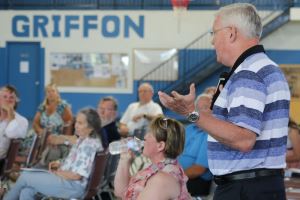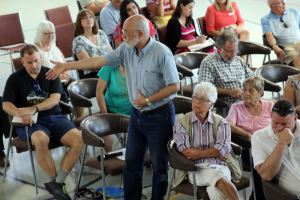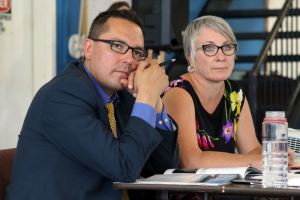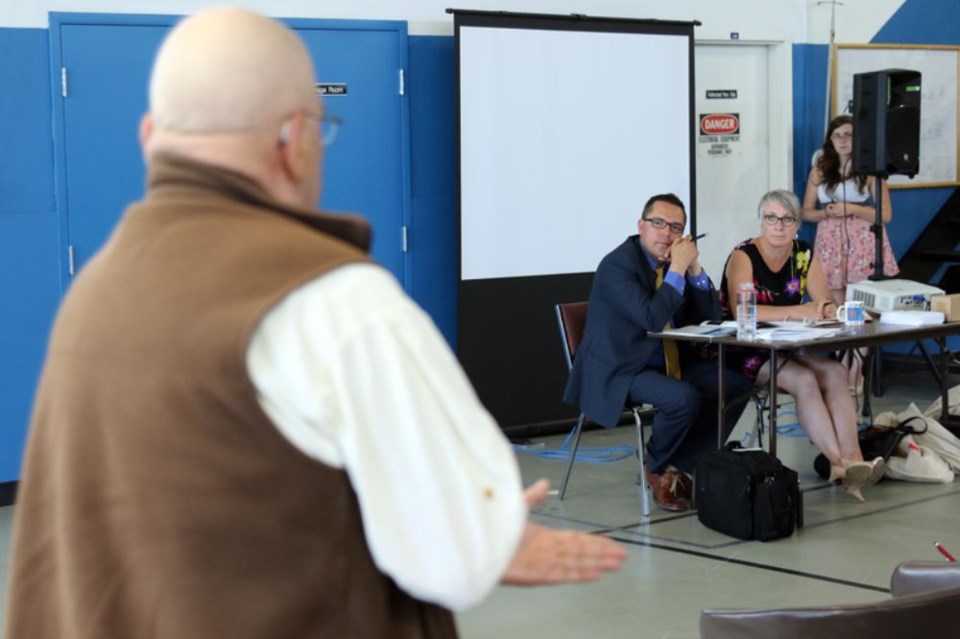THUNDER BAY – Diverse viewpoints on Canada’s role in global security presented elected leaders with no clear direction in the first public consultation in a generation on the Canadian Armed Forces.
Both of Thunder Bay’s Liberal MPs hosted the first of two local consultations regarding the future of Canada’s military at the HMCS Griffon on Wednesday.
Speakers praised the government’s willingness to engage the public but that’s where consensus on Canadian values ended among the crowd of 50 people.
While some yearned for the country to return to its middle-power, Pearsonian peacekeeping role, others insisted the CAF should focus on meeting its military commitments to Canadian allies and engage adversaries of Canadian interests in head-on combat.
John Bell served 26 years in the Royal Canadian Navy. He presented Canadian values as heralding individual rights and freedoms  while being intolerant of bullying as well as racial and sexual persecution. He called for Canada to double its defence spending to two per cent of Gross Domestic Product (GDP) in the 2017 budget.
while being intolerant of bullying as well as racial and sexual persecution. He called for Canada to double its defence spending to two per cent of Gross Domestic Product (GDP) in the 2017 budget.
Bell dismissed peacekeeping as a policy whose effectiveness had clearly passed by the 1990s when he served in Bosnia.
“Some of the quietest sectors around were the Canadian sectors because they knew if they shot at us, we were going to hit them and we were going to hit them hard,” he said.
“The bottom line is, people respect you essentially if you’re going to stand up for what you believe in and you’re prepared to defend it, they’ll look carefully at whether they’ll engage in an inappropriate way.”
Across the spectral chasm, Michael Sobota was among those who condemned economic data as the basis for what he saw as a betrayal of the nation’s moral compass.
While he praised Canada’s recent decision to send 700 soldiers to Latvia as part of a passive defence force, he condemned the Liberal government for following through on the Conservative $15-billion commitment to sell arms to Saudi Arabia.
 Sobota insisted leaders need to focus on peace as the end goal of conflict.
Sobota insisted leaders need to focus on peace as the end goal of conflict.
“If we believe ‘fight fire with fire’ is the way to go, history has proved us absolutely wrong all of the time,” he said.
“How did ISIS get created in the first place? There are huge inequalities in the world for youth who have no hope of moving ahead in the future. Their houses are bombed. Their parents are killed. Their relatives are dead. We’ve created legions of hate in the world and to move forward, what else do they do? They’re recruited into a fundamentalist philosophy of beliefs that the West is abhorrent, the West must be destroyed.
"If we continue to smash each other like that, that’s going to be the result.”
Thunder Bay-Rainy River MP Don Rusnak has taken a personal interest in military procurement since he was in high school. He pointed to a maritime helicopter project and search and rescue technology as evidence Canadians can benefit at home from military spending.
“We need economic benefit through tax dollars we’re spending," Rusnak said.
 "Doing it smartly in terms of making sure we’re innovative, we’re supporting our universities, we’re supporting our innovative companies here in Canada is very important to this government and it’s very important to me that we have good jobs for our highly educated workforce in Canada.
"Doing it smartly in terms of making sure we’re innovative, we’re supporting our universities, we’re supporting our innovative companies here in Canada is very important to this government and it’s very important to me that we have good jobs for our highly educated workforce in Canada.
"We can do that through military procurement.”
Thunder Bay-Superior North MP and self-declared “militaristic novice” Patty Hajdu praised the passion on all sides of the argument. Her deceased brother was a veteran and she appreciated particularly the feedback of those who had served in the military.
“There’s not one absolutely right answer. We have multiple needs and we have multiple, diverse perspectives. For us, it’s really about making sure it aligns closely with our values as Canadians and that we’re well resourced to do the job well,” she said.
The second and last local consultation will take place on Wednesday at the O'Kelly Armoury at 6 p.m.
